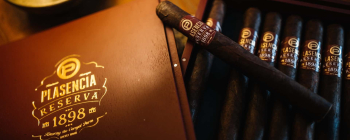
How Long Do Cigars Last?
There are a handful of variables to consider when answering the question, how long do cigars last?
If stored incorrectly, a cigar’s quality may decline within two to three days. After this, it will develop a poor flavor and aroma. However, if it’s stored correctly, it can last years, sometimes improving with age. Cigars have to be kept in ideal conditions to stay fresh. This requires temperature and humidity regulation, made simple with a humidor.
In this article, we’ll take a closer look at the longevity of cigars, and how you can maximize their quality over time.
How Long Do Cigars Last in a Humidor?
Cigar humidors provide temperature and humidity regulation. This helps to keep cigars in peak condition. If the temperature remains between 65-72°F and the humidity stays around 70%, cigars can last for years.
Humidors are purpose-built to store cigars effectively. They contain various components that maintain ideal conditions, including:
- Humidifier: This helps create the ideal humidity within the box. Humidifiers can be electric, gel-based, or even a damp sponge.
- Specialized wood: Humidors are made from Spanish cedar wood, known for its ability to absorb moisture.
- Hygrometer: This measures the humidity levels within the humidor allowing for adjustments.
These components help to prevent cigars from becoming too moist or drying out. This preserves their flavor and aroma, as well as preventing cracking or mold growth. In fact, a humidor can help to improve your cigars over time.
As cigars age, their flavors blend, creating a more complex taste and stronger aroma. Age creates a tightness and consistency throughout the cigar. The smoother draw and even burn will be noticeable.
How Long Do Cigars Last Without a Humidor?
So, how long are cigars good for in general? If left out in the open, a cigar may start to decline in quality after two to three days. This can be shortened further, depending on the surrounding environment.
For example, if you leave an unwrapped cigar on a table in direct sunlight, it will dry out within hours. If you leave it in a cool, dark cupboard, it will last slightly longer. Of course, the best solution is to place it in a humidor.
If you don’t have a humidor, there are DIY methods that will increase a cigar’s longevity. These are:
- Tupperware: Homemade Tupperware humidors are an effective way of keeping cigars fresh. All you’ll need is a Tupperware box, and a damp sponge to create humidity. Placing a Boveda humidity pack in the box will be even more effective. They can keep cigars fresh in a Tupperware for months at a time.
- Sealed bag: Placing cigars in a sealed freezer bag alone can elongate your cigar’s quality for up to two weeks. This is increased if you place a Boveda pack inside the freezer bag.
- Glass jar: A sealed glass jar will work in a similar way to a Tupperware box. As long as it has an airtight seal, you can create some sort of humidity regulation. This won’t be as effective as a humidor, however.
How Long Do Cigars Last in Various Storage Conditions?
There are many different conditions in which cigars are stored during transportation. While a humidor is best, the following conditions are effective in the short term.
How Long Do Cigars Last in a Box?
Cigars left in an unopened factory box will stay fresh for up to six weeks. This number will be reduced if the environment around the box is too warm or too cold.
Leaving cigars in their original box is better than leaving them out in the open. However, the quality of the cigars will decline without humidity and temperature regulation.
How Long Do Cigars Last in a Wrapper?
A cigar left in its wrapper will start to lose its freshness after around four weeks. While wrappers provide some protection, they can’t regulate the temperature or humidity.
This will cause it to dry out unless the wrapper is removed and the cigar is put into a humidor.
How Long Do Cigars Last in Cellophane?
The cellophane wrapper covering new cigars will slow down the drying process. Cellophane is semi-permeable, so it will allow some moisture in. However, this will only buy you around five weeks before the quality begins to fade.
Some smokers will leave the cellophane on their cigars even after they’ve placed it in their humidor. This creates a micro-climate within the cellophane. So, if you decide to take the cigar on a trip, it will retain humidity outside of the humidor.
How Long Do Cigars Last in a Sealed Tin or Tube?
While keeping a cigar in a sealed tin is better than leaving it out in the open, it will only last around six weeks. Even in an airtight tin or tube, the cigar will lack temperature and humidity regulation.
Keeping a cigar in a sealed tin/tube is only recommended for transportation purposes. This will prevent its structure from being damaged while on the go.
How Long Do Cigars Last If You Try to Revive a Dry One?
If one of your cigars has dried out, all is not lost. Dry cigars can be rehydrated over time, although they may not return to how they once were. That’s because a lot of their essential oils will have evaporated during the drying process.
Rehydrating a cigar is a drawn-out process. Rush it and you can reintroduce too much moisture into the cigar, causing cracks in the wrapper. Here’s the step-by-step process for cigar rehydration:
With a humidor:
- Place the dry cigars in the humidor and set the humidity to a low setting, around 62%
- Increase the humidity by 1% each day, until you reach the desired 70%
- Leave the cigar in 70% humidity for two to four weeks
- Gently pinch the rehydrated cigars. If they are firm with a slight give, they will be fine to smoke
Without a humidor:
- Place the dry cigars in a large freezer bag
- Insert a Boveda humidity pack or a sponge soaked in distilled water into the bag
- Seal the bag and put it in a cool, dark cupboard
- Rotate the cigars every few days to distribute moisture evenly
- Repeat this process for up to a month
- Take the cigars out and check their firmness. If they are firm but have a slight give, they are ready
Do Some Cigars Last Longer Than Others? Which Ones?
Although they may often look similar, no two brands of cigar are the same. Different manufacturers use different tobacco blends, different wrappers, and have different fermentation methods. The aging processes with each of these factors can vary greatly.
This means that some cigars will stay good for longer than others. Of course, if you store the cigars correctly, this shouldn’t be an issue.
There are many contributing factors to a cigar’s longevity, including:
- Tobacco quality: Cigars made with premium tobacco will last longer than cigars made from poor tobacco.
- Construction quality: A well-constructed cigar will be seamless, veinless, and long-lasting. Poorly constructed cigars are more likely to degrade over time.
- Wrapper quality: The cigar wrapper is a fundamental part of the overall product. Maduro wrappers are especially noted for their longevity. They have a dark color, which suggests a complex blend suitable for aging.
- Aging potential: There’s no exact way of knowing which cigar will age best. However, cigars with darker wrappers are known for flavor complexity when they age.
Do Cigars Improve With Age?
Keep your cigars stored well and, over time, you’ll notice the fruits of your labor. Premium-quality Cuban cigars tend to start improving after three to five years. Their natural oils develop, mellowing out the flavor and making it more complex.
However, there is a large difference between a cigar lasting and a cigar aging. Some cigars, specifically lower-quality cigars, aren’t intended to age well. In other words, you can’t turn a bad cigar into a good one by aging it.
If you want to invest in cigars with the intention of aging them, it’s best to go for a high-quality Cuban option.
The Bottom Line: Keeping Cigars Fresh
As you can see, the question “how long do cigars last?” throws up lots of different variables. These include the storage device, conditions, and type of cigar.
With the correct storage methods, you can keep your cigars fresh indefinitely. If you have invested in high-quality premium cigars, they will even start to improve with time.
Store your cigars in a humidor and you will start to notice clear improvements after three years. In fact, some connoisseurs believe that a cigar should be aged for five years before smoking.
However you decide to smoke your cigars, be sure to invest in high-quality sticks. At Swiss Cuban Cigars, we stock the very best that Cuba has to offer, with quality always a priority.
So, why not browse our store today to find your next great smoke?
May 07, 2025
Last Modified: May 07, 2025

Table of Contents
- How Long Do Cigars Last in a Humidor?
- How Long Do Cigars Last Without a Humidor?
- How Long Do Cigars Last in Various Storage Conditions?
- How Long Do Cigars Last If You Try to Revive a Dry One?
- Do Some Cigars Last Longer Than Others? Which Ones?
- Do Cigars Improve With Age?
- The Bottom Line: Keeping Cigars Fresh

